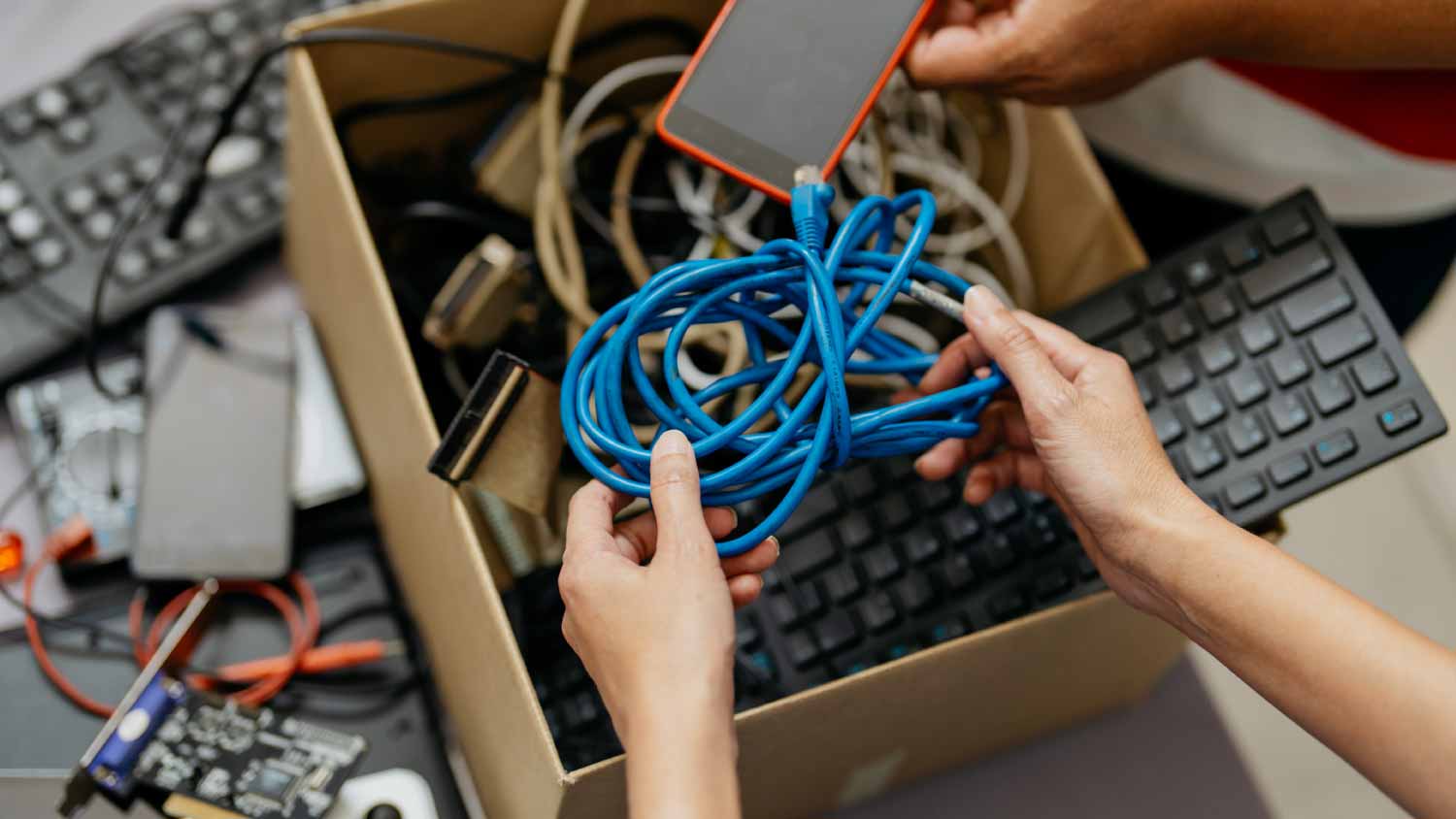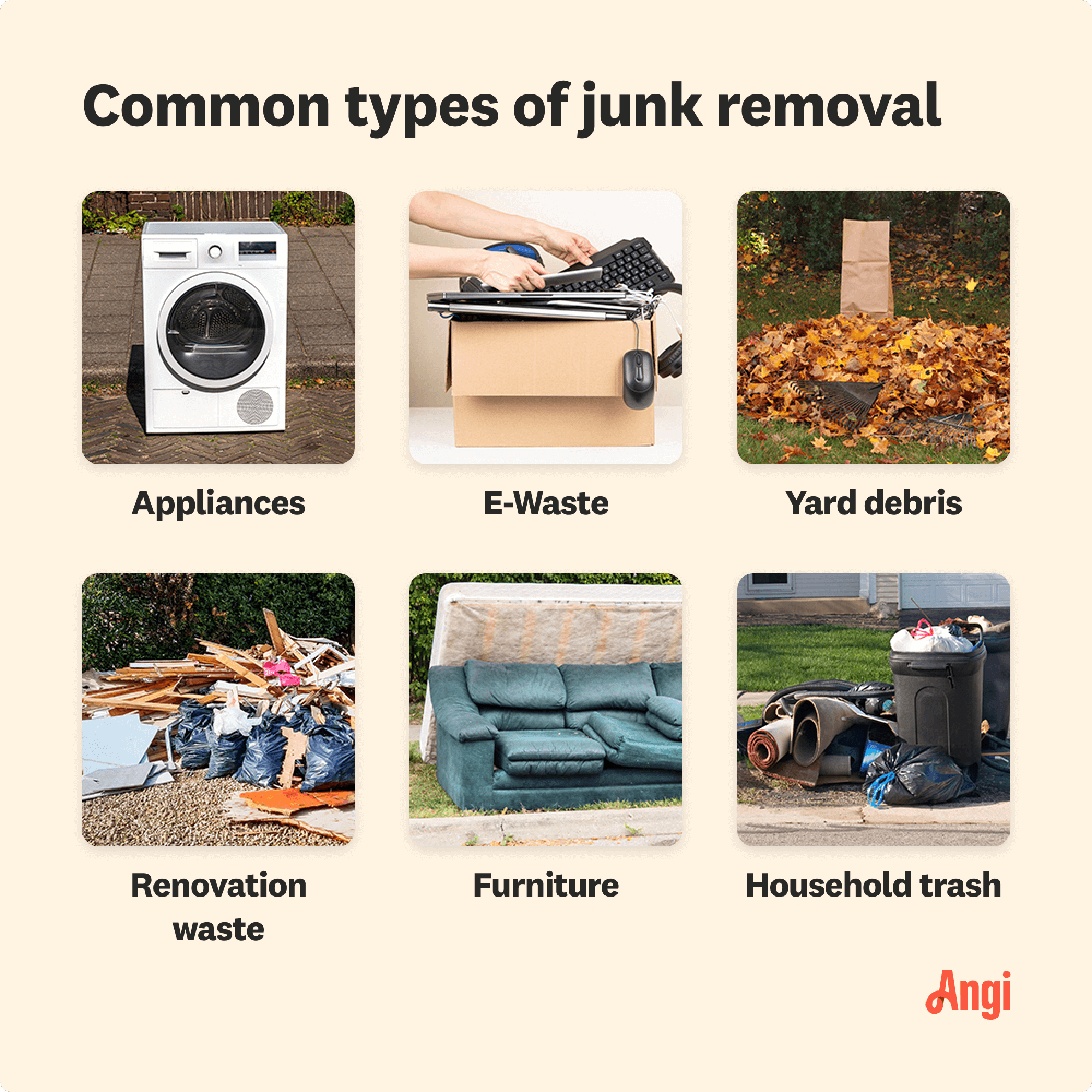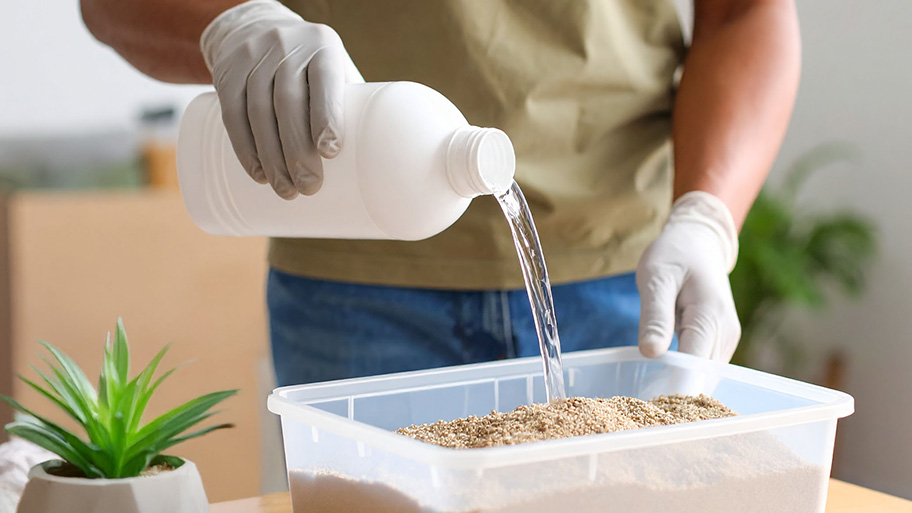
Need to get rid of paint, solvents, or other chemicals? Use this guide on hazardous waste disposal costs to see what professional removal will cost.
Think twice before you toss your unwanted electronics


Electronic waste or e-waste applies to end-of-life electronics that will be tossed rather than reused.
Light fixtures, fans, laptops, computers, smartphones, and refrigerators are all considered e-waste.
Since these devices are often made with toxic chemicals, e-waste can take a toll on the environment if not disposed of properly.
Also known as e-waste, electronic waste refers to any electronic products that will be thrown away rather than reused in some capacity. Believe it or not, the U.S. produces 9.4 million tons of e-waste each year.
Electronic waste is often made of toxic materials such as mercury, lead, beryllium, and cadmium, which can all lead to serious health complications if released into the environment. Therefore, it’s important to be mindful of what is considered electronic waste, what we do with unwanted electronics, and do our best to find a way to reuse them or any of their components.

E-waste refers to any type of electronics that will be discarded instead of reused. The most common categories of electronic waste include:
Heating and Cooling: This category includes air conditioners, electric heaters, fans, and any other devices you use to heat or cool your home.
Office Equipment: Laptops, desktop computers, keyboards, monitors, scanners, fax machines, and docking stations are all examples of office equipment that can become electronic waste.
Large Appliances: Large appliances, such as refrigerators, ovens, dishwashers, washers, and dryers, are widely used in many homes but can quickly turn into e-waste if they’re thrown out.
Small Appliances: Mixers, microwaves, toaster ovens, coffee machines, hot plates, and crockpots that are tossed instead of reused will be considered electronic waste.
Telecommunications: Perhaps the most popular types of e-waste fall into the telecommunications category and may include smartphones, pagers, routers, chargers, and network hubs.
Lighting: Lamps, light fixtures, and light bulbs, including LEDs, are examples of electronic waste when they’re not properly recycled.
Personal Appliances: Personal appliances that you might use for personal care purposes, such as electronic toothbrushes, hairdryers, water picks, and curling irons, may harm the environment if they become e-waste.
The issue with electronic waste is that most electronics contain hazardous materials. When left in landfills for a while, they can enter the soil and water, leading to pollution, which can pose significant dangers for humans, animals, and the environment.
If you treat electronics like garbage and toss them when you no longer want or need them, you’ll add to the problem rather than mitigate it. If you have e-waste lying around that you’re not sure how to dispose of, consider calling a local junk removal company to see if they offer any relevant services.
Fortunately, there are steps you can take to keep electronic waste to a minimum, including:
Do your best to take good care of your devices. Depending on the device, this may mean replacing worn batteries, using screen protectors, and keeping them out of moisture or environments with extreme temperatures. Not only will extending the life of your electronics save you money, but it will reduce your e-waste contribution.
Someone else may be in the market for devices you no longer want or need. If you have a device that works, it’s a good idea to sell it. Facebook Marketplace, Amazon, Best Buy, Apple, and Samsung are all great resources that can help you earn cash for your electronics and save the environment while you’re at it. However, before you sell a device, don't forget to remove your personal information.
There are many local and national organizations that will gladly accept your old electronics as donations. Donating keeps harmful chemicals out of landfills and supports a charity or your community. You can find local nonprofits or donate to a national program like Cell Phones for Soldiers or the World Computer Exchange.
If you’re confident your devices are at the end of their useful life, be mindful about how you recycle them. Find local electronic centers that pledge to safely dispose of your electronics in ways that cause minimal harm to the environment. Contact your local municipality or visit their website for more information.
The next time you want to buy a new device, look for used options. A refurbished computer, for example, can still meet your needs. While new electronics may be more appealing, investing in their used counterparts instead is far better for the environment.

The average cost of hazardous waste disposal, including electronic waste, is around $200. However, depending on the type and quantity of electronic waste, any required permits, or unusual variations resulting from local regulations, you could pay anywhere from $150 to $300. Scheduling a bulky trash pickup, if the company allows the inclusion of electronic waste, is a free or low-cost option. However, recycling your unwanted electronics when possible not only saves you money but also helps protect the environment.
You can make significant savings by disposing of electronic waste yourself. It might not cost you anything—apart from your time and fuel costs to reach a local waste disposal facility. Whether you want to do DIY disposal depends on whether you can handle bulky items or a large quantity of electronic waste and how complex local regulations are. If you dispose of your electronic waste improperly, you could face a hefty fine.
From average costs to expert advice, get all the answers you need to get your job done.

Need to get rid of paint, solvents, or other chemicals? Use this guide on hazardous waste disposal costs to see what professional removal will cost.

Mattresses are considered hazardous waste, so you’ll likely have to pay disposal fees. Use this guide on mattress removal costs to see what your total will be.

Get clear answers on oil tank removal costs, including average prices, key factors, and ways to save. Learn what impacts your project and how to budget.

Caustic ammonia needs to be disposed of safely to protect both your health and the environment. Learn how to dispose of ammonia safely with this guide.

Don’t add to the fast furniture epidemic contributing to overflowing landfills. Learn how to dispose of old furniture ethically and safely.

Charcoal and ash require specific handling when you dispose of them. Learn how to dispose of used charcoal and ash safely.